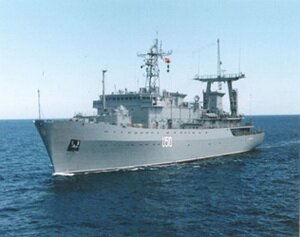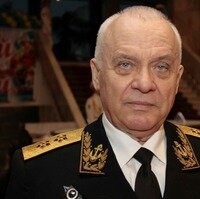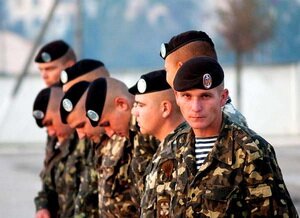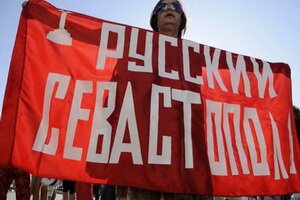
Part 4. “Sevastopol - Crimea – Russia”
Part 3. “How the Black Sea Fleet Was Divided “Fraternally”
Part 2. “Black Sea Fleet on the Scales of Political Tender“
Part 1. “The Russian Federation’s Black Sea Fleet and National Security of Ukraine”
"…Based on support from Moscow, Yu. Meshkov went on to practical actions for tearing away the Crimea from Ukraine in political sphere too. On the 11th of February, 1994, he issued a Decree “On the Interviewing Citizens of the Crimea on Their Attitude to Ukraine”. In fact, this survey had to become a disguised version of the cancelled referendum on independence of the Crimea."
This is how Part 4 of the material of “Crimea 94” ended.
Part 5. “It Nearly Came to War”
As you would expect, all this coincided with the next peak of activity of the Black Sea Fleet, which, anticipating a negative reaction of Ukraine, once again demonstrated its full strength.
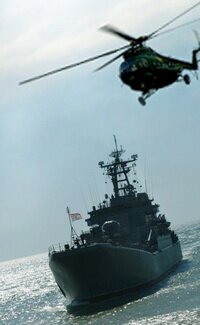 |
|
Helicopter landing. On the 10th of February, 1994 at the training site in the Kazachya (Kossack) Bay, there was held another regular training of subunits of the 126th Division of Coastal Defence and 810th Separate Marine Brigade of the BSF on “Organization of Anti-Landing Defence and Repelling an Amphibious Assault of the Enemy” http://www.arms-expo.ru |
Thus, on the 10th of February, 1994 at the training site in the Kazachya (Kossack) Bay, there was held another regular training of subunits of the 126th Division of Coastal Defence and 810th Separate Marine Brigade of the BSF on “Organization of Anti-Landing Defence and Repelling an Amphibious Assault of the Enemy”. In this training participated one landing company (four Mi-8), seven T-64 tanks, three Battalions of Marine Infantry (BMI), a division of assault guns (18 units), “Nona” Battery (8 units), Air Defence Battery (4 units), “Shilka” Self-Propelled Anti-Aircraft Weapon System. In the course of the training a helicopter assault landing and fire at sea and ground targets were demonstrated.
At this, taking into consideration the political situation on the Peninsula, the Commandment of the Black Sea Fleet was trying to make the trainings as demonstrative as possible, without regard to the safety of their conduct. The result of this approach was not long to wait for. On the 10th of February, 1994 at 3.15p.m. at Kacha airfield two Mi-8 helicopters of the 872-th Separate Anti-Helicopter Regiment collided, which led to deaths of 6 people from the crews.
But nobody cared. Combat training of the Fleet was getting more and more subordinate to political goals of Moscow. Thus, since the end of 1994, units and subunits of the Fleet had been in high combat readiness, because of , as the Commandment of the BSF explained, “threat of their being captured by Security Forces of Ukraine”.
At the same time, the Black Sea Fleet Intelligence sharply activated its work on collecting intelligence on the operation of the Naval Staff of Ukraine and of units and subunits of Security Forces in the Crimea, and, especially, in Sevastopol. In particular, on the orders of the Commander of the Fleet E. Baltin, the Intelligence Directorate of the Black Sea Fleet organized collection of intelligence about the trainings of the Armed Forces of Ukraine on territorial defence in the period from 24 to 28 January 1994, and the participation in it of the Staff of the Ukrainian Navy and the 32nd Army Corps of the Ukrainian Armed Forces.
Active Intelligence work on monitoring daily activities of the 27th Separate Marine Brigade of the Ukrainian Navy was carried out by the Intelligence of the BSF Coastal Forces. The BSF Air Force helicopters periodically conducted visual and photographic reconnaissance of the locations of the Ukrainian Navy and areas of unloading of fighting equipment coming to the Crimea to fully equip the units of the Ukrainian Army.
Meanwhile, being aware of the inevitability of the division of the Fleet with Ukraine, the Black Sea Fleet Commandment continued transferring Naval equipment to Russia. Thus, at the order of the Rocket and Artillery Department of the BSF, in mid-February 1994, ammunition, which could not be directly used for fighting in the Crimea, from the 17th Fleet Naval Arsenal began being transported to Novorossiysk. In particular, this regarded to mines and torpedoes, which could not be used in fighting in the Crimea as Ukrainian Navy actually had no battleships.
As for small arms, under the cover of export to Russia, it often was passed over to pro-Russian organizations of the Crimea, or simply was plundered by the BSF servicemen. In particular, during a regular inspection of weapon depots of the 361st Regiment of Coastal Defence in Evpatoria, six AKM (Kalashnikov’s automatic guns) and one PKK (Kalashnikov’s machine gun) were missing.
Dispute about the ownership of the Black Sea Fleet. “Namedni” (The Other Day) - 1992.
Since the autumn of 1991 until the middle of 1992, Moscow and Kyiv had been disputing about the Black Sea Fleet’s belonging to this or that State
*****
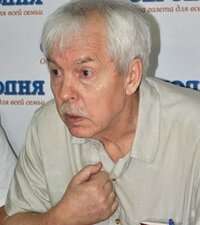 |
|
Yuri Meshkov. Y. Meshkov arranged a special press conference, during which he asked the voters, civil society and labour groups to support his initiative to survey Crimeans on their attitude to Ukraine http://lenta.ru/news/ |
Promises, generously being given by Moscow, were opening wide opportunities to Yu. Meshkov for practical implementation of his strategic plans. However, they could not be fully realized without the absolutely anti-Ukrainian Supreme Council of the Crimean Autonomy, which at that time, despite its provocative actions, was more pro-Communist than pro-Russian. Therefore, all the efforts of Yu. Meshkov and his supporters were focused on preparations for the next elections, this time to the Crimean Parliament.
At this, in the absence of any real abilities to influence solving of real social and economic problems of the Crimea, pre-election campaign of Yu. Meshkov and his “Russia” block was based on building up another wave of anti-Ukrainian hysteria in the Crimea. In particular, March 10, 1994 the “President” of the Crimea issued a second Decree “On Interviewing Citizens of the Crimean Autonomous Republic ...”
However, this Decree of Yu. Meshkov found no support of the Supreme Council of the Autonomy, which was afraid of further increase of the popularity of the “President”. Against the background of the “pre-election battles” this led to aggravation of the contradictions between the executive and legislative branches of power of the Peninsula.
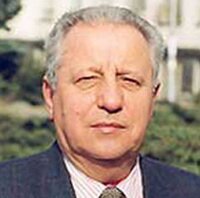 |
|
N. Bagrov, in 1990-1994. - Head of the Supreme Council of the Crimea. The Head of the Supreme Council of the Crimea N. Bagrov criticized the second “President’s” Decree on elimination of the Council of Ministers of the Crimea http://news.allcrimea.net/news/ |
Thus, on the 16th of March, 1994, the Central Election Commission of the Autonomous Republic of the Crimea in its decision blocked the poll, at the excuse of lack of a decision of the Crimean Parliament, which had to approve Yu Meshkov’s Decree. In his turn, the Head of the Supreme Council of the Crimea N. Bagrov criticized the second “President’s” Decree on elimination of the Council of Ministers of the Crimea. According to the Speaker of the Parliament of the Peninsula, the Constitutional body of the Autonomous Republic of the Crimea, which is the Council of Ministers, could be eliminated only by the Supreme Soviet of the Crimea.
In response to the actions of the Parliament, Y. Meshkov arranged a special press conference, during which he asked the voters, civil society and labour groups to support his initiative to survey Crimeans on their attitude to Ukraine. At the same time, he described the actions of the Central Election Commission as “unacceptable excess of its powers, as well as an open political action in support of his rivals in the election”.
Yu.Meshkov’s special appeal was sent to representatives of both, the local bodies of the executive power of the Crimea, and to directors of the Peninsula. In particular, at the meeting with the directors of leading enterprises of the Crimean Autonomy, Yu. Meshkov urged them to join the “Party of the President”, for which purpose he turned the Board of Directors of the Council of Ministers of the Crimea into the Board of Directors at the “President” of the Peninsula.
Taking into consideration the illegal, and most importantly, provocative nature of these events, the President of Ukraine Leonid Kravchuk banned the poll by his Decree from 15 March, 1994.
However, this prohibition did not reined in the “President” of the Crimea and his team. On the same day, with the serve of the Press Service of Yuri Meshkov, newspapers of the Crimean Autonomy began publishing sample ballots for polling residents of the Peninsula. Yuri Meshkov himself made another statement in the media that the “survey will take place, regardless of all Decrees of the President of Ukraine”.
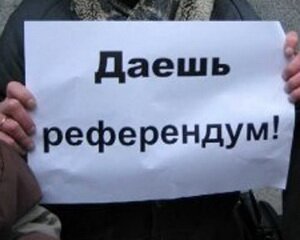 |
|
Give us a referendum! Yuri Meshkov himself made another statement in the media that the “survey will take place |
Simultaneously began a strong pressure on the Central Election Committee of the Crimea in order to implement the intentions of the “President”. As a result of this pressure, in which all possible methods from simple bribery to threats of physical violence, were used, the CEC changed its mind and agreed to conduct a survey on the condition that neither by the form, nor by the content it resembles a referendum.
However, members of the Central Election Commission refused to take part in the calculation of the results of the survey, which again was seen by Yu Meshkov, as their unwillingness to support him.
Crimean communists also activated their efforts, trying to catch up with Yu.Meshkov in the Presidential race. In their Appeal to the electorate, they especially pointed out attempts of the ruling party to bring its representatives to the Supreme Council of the Autonomy through the “artificially created parties and movements”, camouflaging their connections with governmental structures. Besides, the pre-election platform of Communists was published, which contradictory promised “to solve the social problems of the population”, “ to restore the Soviet Union”, “to gain the right of the ARC to economic independence”, “to create an economic union with Russia”, and “to widen the rights of local councils”.
The increased activity of the Communists was opposed by reaction of the “Russia” political block and “Russian-Speaking Movement of the Crimea”. By joint efforts their activists were trying to support Y. Meshkov, increasing the scale of anti-Ukrainian hysteria in the Crimea. In particular, “Russia” block was actively imposing the idea of turning the Crimean Peninsula into “a completely independent state”. In their turn, leaders of the “Russian-Speaking Movement of the Crimea” disapproved of the Decree of the President of Ukraine on banning the referendum of citizens of the Peninsula, calling it “... a gross violation of the Constitution of the Crimea and the Universal Declaration of Human Rights”. Considering the survey absolutely legal, they, for some reason, referred to a nationwide Referendum on the Independence of Ukraine, which, in their view, was “... a gross violation of the Constitution of the USSR”.
Yuri Meshkov himself concentrated his efforts on swinging the situation in Sevastopol, where he expected to receive the greatest support from the Black Sea Fleet Commandment, as well as from various political forces, formed with his participation.
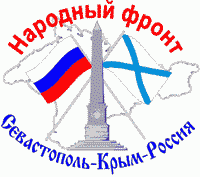 |
|
"Sevastopol - Crimea - Russia". The main ally of the “President” of the Crimea was “Sevastopol-Crimea-Russia” political block, which started holding meetings http://sevkrimrus.narod.ru/ |
In this case, the main ally of the “President” of the Crimea was “Sevastopol-Crimea-Russia” political block, which started holding meetings to put pressure on members of the City Council, and on the Representative of the President of Ukraine in Sevastopol. Strange as it might seem, but Yu. Meshkov was supported also by the Sevastopol Committee of the Communist Party of the Crimea.
The culmination of Yuri Meshkov’s “Sevastopol Epic” was the Session of the City Council, which began on March 22, 1994 with the participation of the “President” of the Crimea. As expected, the Session was held under the banner of anti-Ukrainian rhetoric and ended in joint appeal of Deputies about “... the need for a nationwide referendum on the issue of the Crimea joining Russia, and returning of the Russian status of Sevastopol as the main base of the Black Sea Fleet”.
As a separate problem, there were also touched upon President of Ukraine’s plans to have a Representative in Sevastopol, which was seen by the City Council as a “political mistake of Kiev”. At this, they put forward the condition of the possibility of the appointment of such a Representative only at the City Council of Sevastopol agreement.
Completely satisfied with such results, at the end of March 1994, Yuri Meshkov left the Crimea and returned to Cyprus, ostensibly to meet with investors who had expressed a desire to invest their capitals into the development of the economy of the Peninsula.
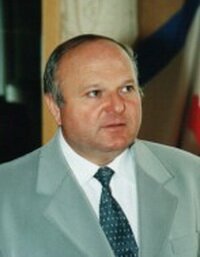 |
|
V.M. Gorbatov, Permanent Representative of the President of Ukraine in the Autonomous Republic of Crimea in 1994-1996. V.Gorbatov especially pointed out the political nature of his future work in the Crimea, the goal of which was to ensure peace and stability in the Peninsula http://src-h.slav.hokudai.ac.jp/ |
In his turn, trying to keep the control of the situation in the Crimea, at the beginning of April 1994 President of Ukraine Leonid Kravchuk decided to appoint V.Gorbatov a Representative to the Autonomous Republic of the Crimea. Speaking on the Crimean television, V.Gorbatov especially pointed out the political nature of his future work in the Crimea, the goal of which was to ensure peace and stability in the Peninsula. According to V. Gorbatov, his confrontation with the leadership of the Crimea was out of the question.
Despite such a position of the Representative of the President of Ukraine in the Crimea, Yu.Meshkov took his appointment as personal insulting, and even as Kyiv’s attempts to limit Meshkov’s own power as of the “president” of the Autonomy. Immediately after returning from Cyprus, he burst into an angry tirade in the media, in which he called the recent events in the Crimea “a political provocation of Kyiv, an attempt of the Ukrainian leadership to make a coup in the Peninsula”. According to Yuri Meshkov, “... the Ukrainian leadership has tried to partially displace the President of the Crimea, and to limit his powers, reducing them to the level of an official of the local administration”. Besides, the “President” of the Crimea expressed his belief that “... all the efforts of the Administration of Ukraine aim at causing a general dissatisfaction in the Peninsula, disruption of the election to the Supreme Council of the Autonomy and, in particular, they want to prevent the victory of “Russia” block, for which 80% of the Crimean citizens are ready to give their voices”.
His speech contained direct insults of the Representative of the President of Ukraine in the Crimea. In particular, according to Yuri Meshkov, “... none of the Crimean people who voted for him in the Presidential elections in the Crimea, would shake hands with V.Gorbatov”. As to the Government of Ukraine, Yuri Meshkov called it “.. dangerous from the point of view of peace and stability in Europe”.
However, despite the verbal bravado, Yu. Meshkov was desperately afraid of really decisive actions of the Ukrainian leadership to remove him from power. To counteract such a possibility, on the advice of the Kremlin, the “President” and his associates made an attempt to take control of the Ministry of Internal Affairs of Ukraine in the Peninsula.
|
Note. From the program of the Republican Party of the Crimea (RDK Party) II. The Political Platform of the Party ...Carrying out a military reform: - … creation of the Republican Guard of the Crimea for the maintenance of public order and protection of the Constitutional order of the Republic http://sevkrimrus.narod.ru/ZAKON/rpk.htm |
As an argument for such a step was put forward a version of the “corruption of the Crimean Police, which could be removed only under the personal leadership of Yu Meshkov”. However, the firm position of the commandment of Police subunits of the Crimea deprived the “President” of such a possibility, and made him create his own Security Forces. Thus, in the electoral program of the “Russia” block there was an amendment to the plans of adoption by the new Parliament of the Autonomy of the Law “On the Republican Guard of the Crimea”, which had to “protect public order and the Constitutional system of the Peninsula”. And to ensure that no one had any doubts about the need for such a structure, Yu. Meshkov and his followers were spreading rumours about plans of local criminal structures (of course with the support of Ukraine) to commit a terrorist act against the Commandment of the Black Sea Fleet.
At the same time, Yuri Meshkov was trying to remove Security Forces of Ukraine from the Crimea. Insisting on withdrawal of Ukrainian troops from the Peninsula, he kept repeating the arguments of the Russian leadership that “... peace in the Crimea is guaranteed only by the Black Sea Fleet presence”. In its turn, “…the dislocation in the Peninsula of units of the Armed Forces of two different countries” was called by Yuri Meshkov “... a very negative factor for the political situation in the region”.
Supporting his “President”, Yu Meshkov’s Adviser on Military Issue, V. Kuznetsov, called the Crimean Peninsula “... the most militarized part of Europe, in which, apart from the Ukrainian Navy, was concentrated a grouping of more than 50 thousand of Ukrainian servicemen”. Based on this, he expressed doubts about the necessity of its presence in the Crimea.
*****
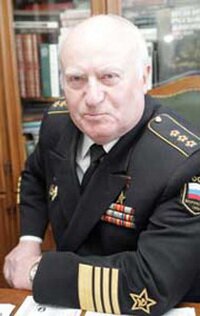 |
|
Admiral Baltin E.D. (1936-2008) Commander of the Black Sea Fleet in 1993-1996 With E. Baltin, an agreement was achieved on the coordination of the lists of candidates from the Black Sea Fleet to the Supreme Council of the Crimea http://ru.wikipedia.org/ |
Of course, the Commandment of the Black Sea Fleet could not help using such a position of the “President” of the Crimea for promoting their representatives to the Supreme Council of the Autonomy, which had to contribute to further strengthening of Russia in the Peninsula. More so, through the representatives of the Fleet in the Crimean Parliament Russia hoped to legalize the fact of the Black Sea Fleet basing in the Crimea, as well as the “Russian” status of Sevastopol.
As early as February 7, 1994, during Yuriy Meshkov’s meeting with the Commander of the BSF E. Baltin, an agreement was achieved on the coordination of the lists of candidates from the Black Sea Fleet to the Supreme Council of the Crimea.
On the 8th of February a meeting of the Coordinative Council of the BSF Officer Assemblies (CCOA) headed by First Rank Captain Volodin, was held in Sevastopol. At this session, the list of candidates to the Supreme Council of the Autonomous Republic of the Crimea from the Black Sea Fleet Officer Assemblies was adopted. Apart from this, the Deputy Head of CCOA, First Rank Captain Shklyar who took part in the Congress of Russian Communities in Moscow, made a speech. On the same day, February 8, 1994, at the Headquarters of the Fleet there was a meeting of the Commanding Staff on the strategy and tactics of the Black Sea Fleet in the present conditions, taking into consideration the situation in the Crimea.
In order to promote their political views, the representatives of the Union of Officers of the Crimea (UOC) took an active part in the meetings of “Russia” block in Sevastopol, which often were under the direct supervision of the Coordinative Council of the Black Sea Fleet Officer Assemblies. In particular, these meetings expressed support to Yuri Meshkov himself and his Decree on the survey on citizens’ of the Crimea attitude to Ukraine. According to statements of the CCOA and UOC leaders, despite Meshkov’s Decree having been cancelled by the President of Ukraine, the survey had to be conducted.
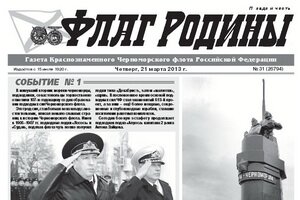 |
|
"Flag of the Motherland” Newspaper of the Black Sea Fleet. Most of the publications of the newspaper were clearly anti-Ukrainian and promoting imperial traditions of Russia http://sc.mil.ru/ |
With the same aim, media of the Crimea kept publishing aggressively chauvinistic materials prepared by various Crimean politicians and representatives of the Black Sea Fleet. In this regard, the most notorious was the “Flag of the Motherland” newspaper of the Black Sea Fleet, which was supposed to remain neutral in the situation of the BSF’s double subordination.
Most of the publications of the newspaper were clearly anti-Ukrainian and promoting imperial traditions of Russia, discrediting the idea of Ukrainian statehood and Ukraine’s right to a part of the Black Sea Fleet. An example of this style of the “Flag of the Motherland” was an interview with the Commander of the Black Sea Fleet E. Baltin, which he gave to reporters on the eve of February 23. In his interview he tried to blame Ukraine in “aggressiveness” and “illegal capturing Russian territories”. In particular, according to E. Baltin, “... in 1932, Ukraine had only five regions, while at the moment of disintegration of the Soviet Union the number of Ukraine’s regions had reached 24”. At this he asked with emotion: “... so then who really leads the imperial policy?”. Besides, based on similar statements, E.Baltin questioned the inviolability of the state border of Ukraine. In his view, “... these borders no one had ever recognized, so the Crimea’s territorial belonging to Ukraine is out of the question”.
On the 15th of March, 1994 in the House of Officers of the Fleet with the permission of E. Baltin, and with the support of the CCOA and of the management of the Department of Educational Work of the BSF under the heading of the Black Sea Fleet Rear Admiral Penkin, a Conference of the Union of Officers of the Crimea, which worked out the pre-election platform for the 19 candidates to the Supreme Council of the Crimea from the Black Sea Fleet (one from each electoral district) was held. During the Conference, representatives of the Union of Officers of the Crimea declared their support to Yuri Meshkov, as well as their organization’s going out of the semi-legal status “due to the political situation having been changed”.
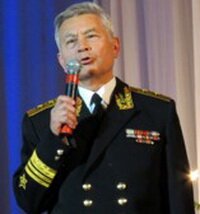 |
|
Vice Admiral A. Frolov, Deputy Commander of the Black Sea Fleet for Combat Training in 1991-1994. In order to support Frolov, at the base of pro-Russian organizations of Sevastopol there was founded “The Black Sea Fleet” political block headed by M. Sibilova http://www.sevastopol.su/ |
Immediately after the Conference, pro-Russian Crimean media began a broad campaign of publication of pre-election programs of the candidates from the Black Sea Fleet. At the same time, with some disagreements on minor points, all of them had been calling for support to the position of the “President of the Crimea”, promoting the idea of tearing away the Peninsula from Ukraine, as well as preserving a sole Black Sea Fleet. In particular, such was the pre-election program of the Deputy Commander of the Navy Vice Admiral Alexandr Frolov.
At the same time, in order to support Frolov, at the base of pro-Russian organizations of Sevastopol there was founded “The Black Sea Fleet” political block headed by M. Sibilova, which immediately got involved in the election campaign. Besides, to help the candidates of the Black Sea Fleet, about 40 Naval officers were sent to spread information materials in Sevastopol and other cities of the Peninsula.
Along with this, the Commandment of the Black Sea Fleet continued to escalate anti-Ukrainian hysteria and frighten local residents and military personnel with a possible war between the Crimea and Ukraine. Such actions were preparing public opinion to accept such a conflict as normal.
One example of such-like events was the pre-election meeting of candidates from the BSF with voters in the House of Officers of the Fleet. During the meeting, those present were under a hard psychological pressure in the form of statements like that if they did not vote “as needed”, the Union of Officers of the Crimea will have only a military way of solving the problems of the Crimea. Characteristically, 90 % of this organization were regular officers of the Black Sea Fleet.
Igniting passions even more, Press Center of the BSF made a statement in which it pointed out that “.. at any attempt to capture a part of the Black Sea Fleet, an order will be given to use weapons against the Armed Forces of Ukraine”.
|
Notе. This is how the events of those days are described by the former commander of the Black Sea Fleet, Admiral Baltin E.: «... Not a day passed, tells Admiral, without a visit of this or that inspection from Kiev. They were sticking their nose into all our affairs.They were checking our finance, logistics, maintenance, fuel supplies and other things. They even wanted to take control of our secret operational documents, but I did not let them on the threshold of the Headquarters. I put out armed guards. In the city their patrols were catching our officers and just imprisoning in the guardhouse without any reason. And nothing could be done. Prosecutors were Ukrainian, the court was Ukrainian, Security Service was Ukrainian, Police was Ukrainian, everything was Ukrainian ... There was nothing we could do. I'm phoning the General Prosecutor of Russia, Yuri Skuratov, asking him for help, but he just waves away. At two o'clock in the morning I used to raise the Chief of the Ukrainian Security Service Yevhen Marchuk, and demand to stop the havoc. I phoned Ukrainian President Leonid Kravchuk, but this helped very little. One of the regular “inspectors” said to me directly, "Eduard Dmitriyevich, our task is to write such an act which would help to remove you from Sevastopol”. But they did not manage to do it. I preserved all the property and arms of the Fleet, from Izmaill to Novorossiysk, all the 119 ships, which were subordinate to me, 80 of them had even been repaired by me. I managed to pass something (small landing ships on air cushion included) over to the Caspian Sea, to the Caspian Flotilla. Something was sent to the North ... But they could not take anything away from me. Today the Black Sea Fleet occupies only 4.5 percent of the area of the 100 percent that it used to under my command. At my time they could not chop off an inch. So I told Kravchuk, “If you do not stop the lawlessness, I'll shoot! Under my command there are 44 000 combat blocks"[here and further the selection in the quoting is by Borysfen Intel]. I remember it all with disgust, said the Admiral. But the leaders of Russia, the Ministry of Defence, the Chief Commandment of the Navy had just left us there, “on the edge of the known world”. While from Kyiv I had been receiving some orders, dispatches almost every day, from Moscow, often for several months, I had not had a single call. Even food supply had stopped. People had not been paid for several months. And you sit there – saving for Russia its Fleet, taking care of the ships, the officers and their families - only in your own country nobody needed it. When salaries had not been paid for three months, I called the minister and said "If you do not send me money, I will have to send a detachment to Istanbul, to do a little plunder there. I served in the Intelligence, so I know the city. All its markets, including the large indoor one. For me it is very easy. The Turks will not have time even to scratch ...” http://flot.com/nowadays/concept/reforms/ref41.htm?print=Y |
***
And it was not just a threat. Against the background of active participation in the election campaign in the Crimea, the Black Sea Fleet Commandment continued purposeful preparation for using force against Ukraine. Thus, it was a “pressing need to lead the policy of force in relation to Ukraine” with which E. Baltin explained plans to create mobile forces at key points in the Crimea, namely in Sevastopol, Feodosia and Kerch .
The issue of further strengthening of the 126th Division of Coastal Defence of the Black Sea Fleet by deploying its subunits up to the war establishment, was also considered. To work out this issue, at the end of March 1994 a group of officers of the General Headquarters of the Russian Federation arrived in the Division. Following the visit, it was decided possible completing the staff of the 126 RBS of the BSF in emergencies with ascribed staff from Krasnodar region.
Along with organizational measures, the Fleet continued to demonstrate its strength and capabilities. On the 17th of March, 1994 as part of three-day trainings a complex march to sea was carried out by about 30 surface ships and two submarines of the Black Sea Fleet.
How the war in the Crimea will begin - Russia's view ... Published on the 26th of September 2009
At the same time the Commandment of the Black Sea Fleet was giving all possible assistance in the formation of Yu.Meshkov’s Security Forces. On the 19th of March, 1994 during the election meeting of the Union of Officers of the Crimea and the Coordinative Council of BSF Officer Assemblies, the Head of the UOC Shipitsin supported Yuri Meshkov’s plans to establish the National Guard of the Crimea. According to him, the basis for this power structure would be the Union of Officers of the Crimea. In fact, this step meant a direct participation of the Black Sea Fleet in formationof illegal armed structures in the Peninsula. Moreover, the National Guard of the Crimea, apart from officers from the UOC, was supposed to include BSF servicemen in active service.
Based on the apparent superiority over Ukraine, the Black Sea Fleet Commandment was not too ceremonious in its actions in the Crimean Peninsula. Any attempt of Ukraine to establish Law and order in the Autonomy was confronted by demonstrations of force that were supposed to show who were the “true Masters of the Crimea”.
One such example was increasing combat readiness of the Fleet in response to Kyiv’s appointment of President of Ukraine’s Representative in the Crimea. Within the framework of appropriate activities, on the night of 2 to 3 April 1994 Commanders of Fleet units were called to places of service, as well as was strengthened protection of important objects and representatives of code bodies. Personnel of the 810th Separate Marine Brigade received bullet-proof vests. To the strengthened mode of work were put also commanding points of units and subunits and of the BSF, including staff of ships. Characteristically, all these activities were closely coordinated with the “Presidential” structures of Autonomy, which were in constant communication with the Headquarters of the Black Sea Fleet.
A similar reaction was caused by the visit to the Crimea of representatives of the Armed Forces of Ukraine on the 5th of April, 1994. At this, on the part of the “President” of the Crimea were put forward absolutely unacceptable demands in future to coordinate such visits with the Commandment of the Black Sea Fleet and the Republican authorities of the Crimea.
Against this background, the Commandment of the Black Sea Fleet sharply intensified Intelligence activity against the power forces of Ukraine in the Peninsula, without ignoring any Ukrainian ship. In particular, 6 April 1994 a control ship “Slavutych” of the Ukrainian Navy, which was on the planned military trainings, was followed by four warships of the Black Sea Fleet.
An active part in this process was taken by the leadership of the Crimea and, above all, Yuri Meshkov’s Adviser on Military Matters - a former Commander of the 32 Army Corps, General Kuznetsov, with whose assistance collection and processing of information on the state of combat readiness of the Armed Forces of Ukraine in the Peninsula was organized.
* * *
However, such an attention of the Black Sea Fleet, and of Russia in general, to the Security Forces of Ukraine was understandable. They were the main obstacle to securing Russian positions in the Crimea. With this in mind, the Commandment of the Black Sea Fleet took a most active part in the campaign of the Crimean authorities to reduce the Ukrainian military presence in the Peninsula.
Thus, the subordinate to the Fleet Media picked up publications from Crimean newspapers about the “militarization of the Peninsula by Ukraine”. As always, “The flag of the Motherland” did its best. On the 9th of April, 1994 this newspaper published an appeal in which it was stated that within a short period of time the number of troops of the Ukrainian Armed Forces in the Crimea had increased from 18 to 60 thousand people. And, in Sevastopol alone 500 Ukrainian Marines allegedly were placed at Nakhimov Navy School, and a subunit of 30 men of Special Forces was deployed on “Slavutych” control ship. These “facts” were considered a “strong pressure of Ukraine in order to disrupt the elections to the Supreme Council of the Crimean Autonomy”. On the basis of such statements demands to withdraw Ukrainian Security Forces from the territory of Crimea were put forward.
Against this background, clearly contradicting itself, “The Flag of the Motherland” was spreading information about the “complete decline of the Armed Forces of Ukraine”, the reason for which was called “the failure of the Ukrainian leadership to manage subordinate troops”. On this basis, on behalf of the Black Sea Fleet, there was made a proposal “to ensure security in the region in case of an agreement between Moscow and Kyiv on withdrawal of Ukrainian armed formations from the Crimea”. Besides, the newspapers quoted opinions of representatives of the Black Sea Fleet, like the following: “joint dislocation in the Crimea of the units of the Black Sea Fleet and of the Armed Forces of Ukraine only complicates coordination of their actions”.
Within the framework of “demilitarization” of the Crimean Peninsula, the Black Sea Fleet Commandment continued to obstruct the process of creation of the Ukrainian Navy, as well as its activities in the region. In particular, the Commander of the Black Sea Fleet E. Baltin forbade the work of the joint Commission of the Ministry of Defence of Russia and the Ministry of Defence of Ukraine to check the supply and availability of fuel in the units and subunits of the Fleet.
Besides, the Commander of the Black Sea Fleet took a decision to stop the free service of navigation equipment in the North-Western part of the Black Sea in the area of the mouth of the Danube up to Chernomorskoye village in the Crimea, as well as in the port of Yalta. The reason for such decision was explained by the fact of “Ukrainian ports owing money to Hydro-graphic Service of the Black Sea fleet”.
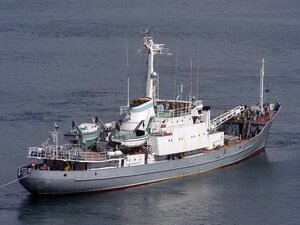 |
|
BSF hydro-graphic vessel "Cheleken". On the night of April 9, 1994 a hydro-graphic vessel “Cheleken” of the Black Sea Fleet, illegally brought from Odesa radio-navigational hydro-graphic equipment http://ru.wikipedia.org/ |
Apart from this, the Russian side continued its open robbery of the Black Sea Fleet of its property, and shipping the latter to Russia. In early April 1994, these actions of the Commandment of the BSF almost led to an armed conflict between Russia and Ukraine.
Thus, on the night of April 9, 1994 a hydro-graphic vessel “Cheleken” of the Black Sea Fleet, illegally brought from Odesa radio-navigational hydro-graphic equipment. The crew of the ship refused to meet a condition of Ukrainian border guards on examination of the cargo and did not show documents on it. When the Ukrainian side tried to prevent the ship’s going out to sea, at the order of the Commandment of the Division of ships of the Black Sea Fleet, about 30 armed soldiers arrived on board the ship.
Besides, the Deputy Brigade Commander of the Ukrainian Navy surface ships Captain of the Second Rank N. Zhibarev, who arrived on ”Cheleken” for negotiations, was detained. At this, the Ukrainian officer was released only under the threat of intervention of the Marine Corps of Ukraine into the conflict.
Despite the official ban from the Ukrainian authorities, ”Cheleken” went to sea in violation of the rules of navigation, which caused an accident situation in the port of Odesa. On the 9th of April, 1994, escorted by Ukrainian border ships, “Cheleken” arrived in Sevastopol, where it was moored in the South Bay under the protection of a subunit of Marines of the BSF.
|
Note.
From the memoirs of the Commander of the Ukrainian Navy in 1993-1996, Vice Admiral Vladimir Beskorovainy: "... The most dangerous and at the same time determining the future of the Ukrainian Navy, conflict was the one which took place in the first half of April 1994 in Odesa, as reports the newspaper “Den’”(Day). “In the evening of April 8 the operational officer on duty of the Ukrainian Navy received a call from Odesa: a hydro-graphic ship of the BSF “Cheleken” was ready to leave the Prakticheskaya Harbour. Without a permission of the Government of Ukraine, in Odesa radio navigation equipment was de-installed and loaded on board the ship. Thereby the navigation system in the district was destroyed. Immediately a report to the Defence Minister was sent to Kyiv from Sevastopol. The Chief of the Defence Ministry ordered not to allow the ship to go to sea. Ukrainian border guards and Marines arrived in the harbour. To detain the ship, the guard was put at the mooring lines. But when the Border Guards, Customs and the Senior Naval Officer of Odesa boarded the ship, the crew members aimed their automatic guns at them and tried to arrest them. Mutiny on the ship angered the official Kyiv and Odesa received an order to conduct an inspection of “Cheleken” the next morning. Vladimir Bezkorovainyi points out that the rigidity of actions of the Ukrainian side was not accidental. At the Headquarters of the Navy they had been tracking commercial activity of individual chiefs of the BSF and had found out that their Russian colleagues had been earning by smuggling, using hydrographic and auxiliary vessels. In particular, the Chief of the BSF Headquarters Petro Svyatashov together with the management of the Hydro-Graphic Service and Logistics of the Fleet, had been organizing “commercial” cruises. Smuggle was carried by ships. Having sailed out of the port, the ships changed the flag of the non-existing Soviet Navy to the flag of the Russian Navy. This way they got the status of extraterritoriality, and could easily sail about on the Black Sea and were not subject to inspection. Often their course was to Bulgaria. It was from this country that “Cheleken” arrived in Odesa. According to the operational information, the newspaper states, in the holds of the ship apart from the stolen hydro-graphic equipment, there was smuggle - sugar. The desire to conceal this fact made the Russian Admiral take radical measures. Late in the evening Headquarters of the 318th Division, located in Odesa, received an order from Sevastopol, which read “Bring the ship to sea at any cost”. At 23:40 the Commander of the 318th Division led to the board of “Cheleken” a platoon of sailors with guns who had been ordered to “load weapon and shoot at any attempt to arrest the ship”. Ukrainian guards, who had been put at mooring lines of “Cheleken”, was unarmed and could not influence the situation. Russian sailors on the deck cut their mooring lines with axes. The ship left the port and headed for Sevastopol. The Ukrainian side did not use weapon from other ships to stop the ship.
At 6:00 am on April 9 Ukrainian border guard boats were sent for “Cheleken”. Four Su-15 ground-attack aircraft were raised into air. In response, from Sevastopol to help the ship-fugitive came a Naval Strike Ships Group of the BSF. The conflict was becoming dangerous, and to avoid bloodshed, Kyiv decided to inspect the ship in Sevastopol. When “Cheleken” had moored, the BSF Headquarters, using Marine Corps, did not allow the inspection of the ship. Representatives of the Security Service and the Prosecutor's Office were let on board a ship only after everything from the vessel had been overloaded to another ship. No evidence was found. Kyiv was not going to leave the disobeying of the 318th Division unpunished. The Division had used weapons and opposed the Ukrainian authorities, so its days were numbered, Bezkorovainyi told the newspaper. A criminal case was opened on the fact of the ship’s fleeing, and on 9 April a decision was taken to disband the 318th Division. The operation had to be carried out by a company of paratroopers on the night of April 10, in order to have completed it by the 50th anniversary of liberation of the city from Nazi invaders. At the signal, the paratroopers isolated the guards of the Division, captured a weapons storage, the Command Post and Communications Center. It all happened in a matter of minutes. About 80 servicemen of the Division did not even realize what was happening as they were arrested. They were taken to the polygon near Odesa, where they were questioned by the Military Prosecutor. Then the Russians - officers and men - and their families were put on a train and sent to Russia. Sailors, citizens of Ukraine, were assigned to other Ukrainian military units. By 8 am on April 10 it was all over, and in the place of the 318th Division had already been formed the Western Sea Area of the Ukrainian Navy ...” Admiral Baltin’s View of these events: "... What smuggle can be on a hydro-graphic vessel, which was”Cheleken”, asks Admiral Baltin. It all from the keel to the truck was packed with special equipment that supplies the Fleet with information, needed for safe navigation and solving other tasks. [About “Cheleken”’s capability to carry about cargo - see the Note of Borysfen]. Combat tasks included. They just wanted to capture “Cheleken” in Odesa, but I could not let that happen. I ordered to give weapons to the servicemen and to protect the property of the country to the last bullet. How else could I act, if the lawlessness of Ukrainian politicians and officials was reaching senility?” http://flot.com/nowadays/concept/reforms/ref41.htm?print=Y |
Photos in the heading of the material http://ru.tsn.ua/


